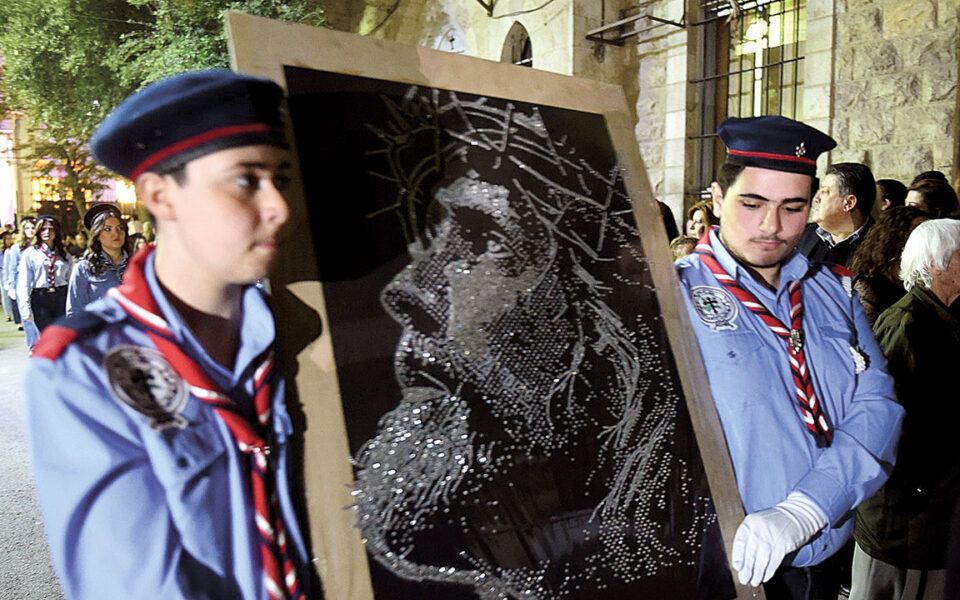Easter in Syria with armed guards

The Christian Orthodox community in Damascus filled the churches during Holy Week under heavy police protection
The Christians of Syria filled their churches to capacity during Holy Week, culminating in the Easter service, sending a message that they remain strong and resisting the new, very difficult challenges facing the country. The ominous predictions that churches would remain closed and the faithful would celebrate Easter as they celebrated Christmas, that is, confined to their homes in fear of extremist jihadists, were proven wrong.
Churches throughout the country operated without interruption, with an unprecedented influx of believers both in the Epitaph procession on Saturday and the Easter Sunday service. Transitional President Ahmed al-Sharaa and his government protected the Christian celebrations, because if they had prevented them, the image of the new Syria would have been tarnished internationally, at a time when the administration is in great need of acceptance from the West.
Thus, by presidential decree, Easter Sunday was declared a public holiday, while a government delegation attended the Resurrection service at the Greek Orthodox Patriarchate of Antioch in Damascus, which was officiated by His Beatitude Patriarch John X of Antioch and All the East and attended by Greek Ambassador His Excellency Emmanuel Kakavelakis.
However, to maintain order and prevent the risk of jihadist attacks, the interim government deployed armed police officers loyal to the new administration, who guarded the churches with the assistance of Christian militia.
The Epitaph procession
Maria-Athina Stefanou, a permanent resident of Damascus of Greek origin, enthusiastically described to Kathimerini the joint celebration of Easter by Orthodox and Catholic Christians. “Thank God, the churches functioned normally. Many, many people participated. Scouts went around the neighborhood, boys and girls with trumpets and tambourines played hymns. On Good Friday we carried the Epitaph around our neighbourhood, called Al-Qassaa, and it was very beautiful. There, the Orthodox have the Church of the Holy Cross and right across from it is the Church of Saint Cyril of the Catholics. They also had a celebration, their church was also full, they brought out their Epitaph,” she said.
“The Bab Touma neighbourhood of Damascus, which is full of churches, is where the patriarchate is located. The patriarch celebrated the Resurrection there on Sunday morning. Here, in the Church of the Holy Cross, we celebrated it on Saturday evening. In Latakia, Aleppo, everywhere, there were Resurrection services and the churches were full,” Stefanou continues. “In Damascus, the Epitaph procession was magnificently carried out, followed by thousands of believers around the courtyard of the patriarchate. The [Greek] ambassador was also holding it. It was very impressive and the atmosphere was solemn. At the end of the service, young men walked in the streets of the neighborhood beating tambourines to convey the message of the Resurrection. They were young Syrian Orthodox, there aren’t many of us left here, there are 80 families and very few young people.”
When asked if the religious ceremonies were held in a climate of fear, given that the government does not control the scattered armed extremist Islamist groups, Stefanou told us: “The government had taken some security measures, the police came, they closed the road to prevent cars from moving, there was silence. We held the Epitaph procession and the Resurrection service. We were all afraid at Christmas, it was a new government at the time, we did not know its intentions, but now everything went smoothly and we celebrated Easter together, Orthodox Syrians and Greeks with Catholics, Latin Church Catholics, Maronites, Armenians, all the churches were packed. For us, it was as if Christ had risen again in Syria.”
How strict were the security measures? “In every church, four or five young men from the neighborhood stood alongside the armed police officers to check that no one suspected of a terrorist act entered. There was such fear, which is why they closed the surrounding streets so that no cars that might be mobile bombs could approach the church,” she told Kathimerini.
“During all these days of the holidays, in the Christian neighborhoods, the young men formed groups of four or five people at night and patrolled, guarding the neighborhood, the houses, so that no stranger would enter and throw a bomb or shoot – this lasted from 10 at night until 6 in the morning.”
Stefanou did not fail to note that Christians also observed the custom of cracking red-dyed eggs and distributing sweet tsoureki bread. As for the traditional spit-roasted lamb, she said that, in the past, when there were more Christians in Damascus, they would go out into the fields and roast. “Now, there are no people for such things…”
Source: ekathimerini.com




